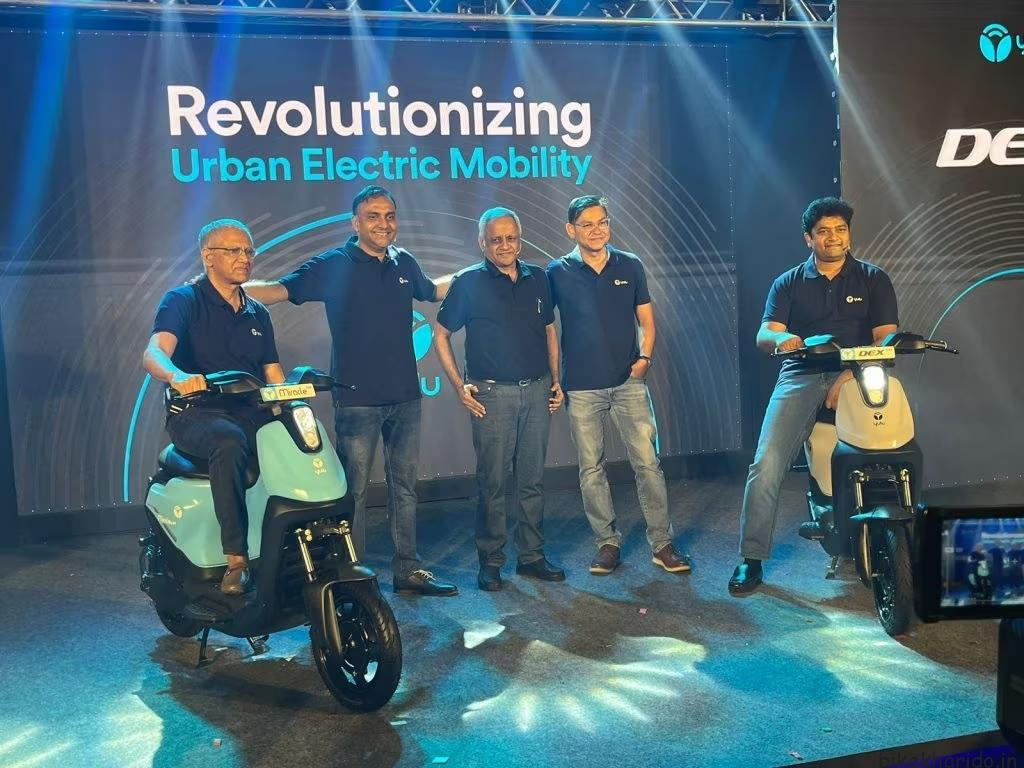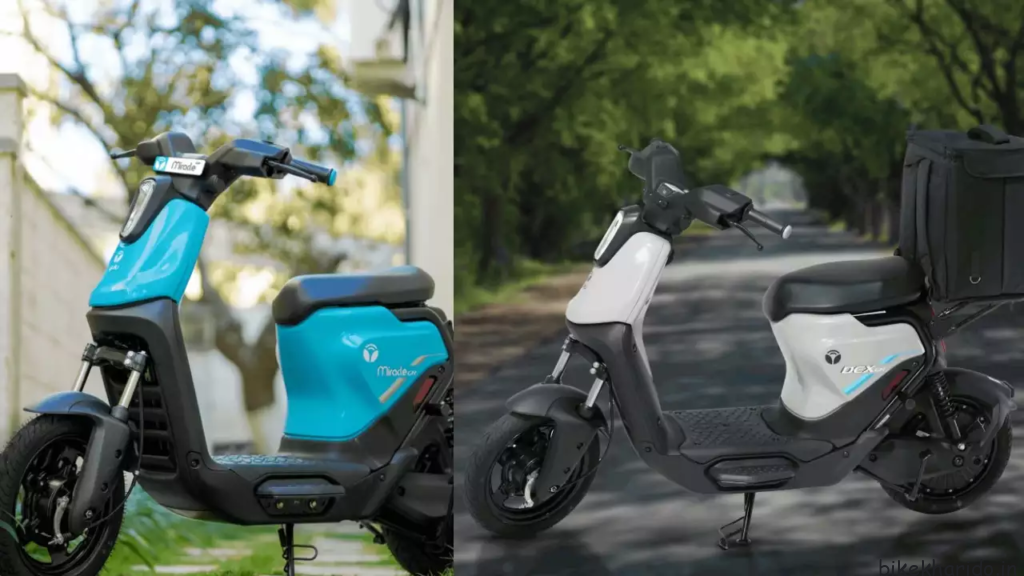Yulu Bajaj Electric Two Wheelers Launch
Yulu launches two new e2Ws Miracle GR and DeX GR in collaboration with Bajaj Auto

Both the Miracle GR and DeX GR will be powered by Yulu’s AI-led technology and will be manufactured by Bajaj Auto in India. Through this partnership, both Yulu and Chetak Technology Ltd.
The Yulu-Bajaj partnership focuses on offering sustainable last-mile mobility and deliveries in urban areas. Yulu’s shared mobility management ensures the right insights. Bajaj Auto’s leading R&D and manufacturing capabilities contribute to this shared goal.
You may like it : Best electric bike in India
Yulu Bajaj Electric Two Wheelers Launch
Yulu’s AI-led tech stack and Bajaj Auto’s Chetak Technology Ltd. have jointly created Yulu’s third gen e-scooter – Miracle GR and DeX GR. These purpose-built electric 2-wheelers are energy efficient, strong, and durable.
They’re designed to deal with Indian road conditions and local weather. The result is an excellent customer experience and powerful unit economics, which results in improved financial metrics for Yulu.
Yulu’s goal of putting 1,00,000 e-scooters on the highway is about to lead to ten-fold growth in revenues by year-end. Yulu’s third generation vehicles have already impacted the shared mobility space. And thereby, the way forward for electric vehicles.

You may like it : River Indie Price Is Rs. 1.25 Lakhs
Shared mobility – Meeting the Demand for Affordable Access, Finest-in-Class Ride, and Green Commuting
It goes without saying, the potential of this platform is gigantic. Success of these purpose-built vehicles depends on a number of factors. Yulu’s energy infrastructure and Bajaj Auto’s forward-looking strategy, which prioritizes EVs, are key pillars.
The Yulu-Bajaj partnership and their new electric 2-wheeler platform are a brand new benchmark for urban mobility. Rapidly changing mobility needs and disruption in traditional possession models call for sustainable and innovative solutions. And this partnership has the potential for market leadership within the shared mobility space.
Innovative Swappable Battery System: Addressing the Challenges of Electric Vehicle Charging
Yulu and Bajaj Auto’s collaboration is a superb example of how partnerships between new-age companies and traditional OEMs can revolutionize city mobility.
As demand for sustainable and progressive mobility solutions will increase, such collaborations are likely to become extra common in future. This partnership is aligned with the market’s expectation of affordable access, best-in-class experience, and green commuting, that are key drivers of progress within the shared mobility space.
Yulu is using swappable batteries to power its fleet of electric vehicles. These batteries are provided by Yulu’s partner, Yuma Energy. Customers can easily exchange them at any of the 100 Yulu stations located in Bengaluru, Mumbai, and Delhi. This makes the charging course of extra convenient and efficient.
Riders can shortly swap out depleted batteries for fully charged ones instead of ready for the autos to charge. Plans are afoot to expand the community to 500 by 2024, additional enhancing accessibility and value of its electric micro-mobility services.
The success of those purpose-built vehicles relies on a number of factors, together with energy infrastructure and battery charging facilities.
Yulu Bajaj Electric Two Wheelers Launch
Yulu launches two new e2Ws Miracle GR and DeX GR in collaboration with Bajaj Auto

Both the Miracle GR and DeX GR will be powered by Yulu’s AI-led technology and will be manufactured by Bajaj Auto in India. Through this partnership, both Yulu and Chetak Technology Ltd.
The Yulu-Bajaj partnership focuses on offering sustainable last-mile mobility and deliveries in urban areas. Yulu’s shared mobility management ensures the right insights. Bajaj Auto’s leading R&D and manufacturing capabilities contribute to this shared goal.
You may like it : Best electric bike in India
Yulu Bajaj Electric Two Wheelers Launch
Yulu’s AI-led tech stack and Bajaj Auto’s Chetak Technology Ltd. have jointly created Yulu’s third gen e-scooter – Miracle GR and DeX GR. These purpose-built electric 2-wheelers are energy efficient, strong, and durable.
They’re designed to deal with Indian road conditions and local weather. The result is an excellent customer experience and powerful unit economics, which results in improved financial metrics for Yulu.
Yulu’s goal of putting 1,00,000 e-scooters on the highway is about to lead to ten-fold growth in revenues by year-end. Yulu’s third generation vehicles have already impacted the shared mobility space. And thereby, the way forward for electric vehicles.

You may like it : River Indie Price Is Rs. 1.25 Lakhs
Shared mobility – Meeting the Demand for Affordable Access, Finest-in-Class Ride, and Green Commuting
It goes without saying, the potential of this platform is gigantic. Success of these purpose-built vehicles depends on a number of factors. Yulu’s energy infrastructure and Bajaj Auto’s forward-looking strategy, which prioritizes EVs, are key pillars.
The Yulu-Bajaj partnership and their new electric 2-wheeler platform are a brand new benchmark for urban mobility. Rapidly changing mobility needs and disruption in traditional possession models call for sustainable and innovative solutions. And this partnership has the potential for market leadership within the shared mobility space.
Innovative Swappable Battery System: Addressing the Challenges of Electric Vehicle Charging
Yulu and Bajaj Auto’s collaboration is a superb example of how partnerships between new-age companies and traditional OEMs can revolutionize city mobility.
As demand for sustainable and progressive mobility solutions will increase, such collaborations are likely to become extra common in future. This partnership is aligned with the market’s expectation of affordable access, best-in-class experience, and green commuting, that are key drivers of progress within the shared mobility space.
Yulu is using swappable batteries to power its fleet of electric vehicles. These batteries are provided by Yulu’s partner, Yuma Energy. Customers can easily exchange them at any of the 100 Yulu stations located in Bengaluru, Mumbai, and Delhi. This makes the charging course of extra convenient and efficient.
Riders can shortly swap out depleted batteries for fully charged ones instead of ready for the autos to charge. Plans are afoot to expand the community to 500 by 2024, additional enhancing accessibility and value of its electric micro-mobility services.
The success of those purpose-built vehicles relies on a number of factors, together with energy infrastructure and battery charging facilities.



